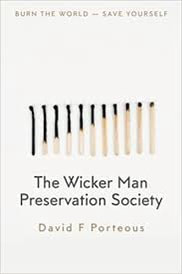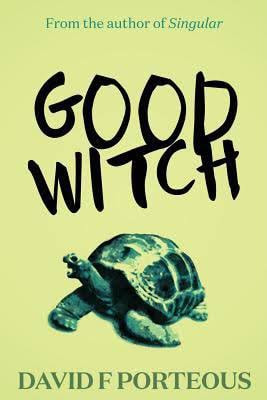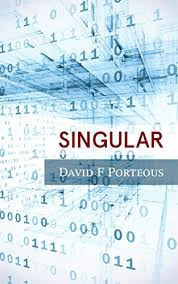dfpiii.com |
The website of David F Porteous |
|
The virtual book tour for Singular has been arranged. Twenty dates from 16 May to 30 June 2011 including 7 interviews with me, 8 guest blogs, 3 reviews and at least 5 prize giveaways (including a one-of-a-kind prize to be announced on the 16th). I'm very excited to be working with the Virtual Book Tour Cafe and with all the other bloggers and reviewers involved.
I'll be using the Twitter hashtag #svbt (Singular Virtual Book Tour) and I'll use the SVBT tag on my blog so you can keep track of all the latest posts and updating the Singular's page on Facebook.
0 Comments
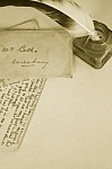 To a writer, an idea is almost worthless. For every story you tell, there are somewhere between ten and a hundred that you’ll never find the time for. You hope that you pick the right ones in which to invest what’s really valuable – your time; but as the story twists and turns in unexpected ways as you write it, you can’t be sure what the seeds you plant will grow into. A few weeks back I committed to one story over a number of others I’d been considering (which I may still write at some point in the future). This story is something different. I decided very early in my process that I would write it in such a way that I would never have to use the words “he said” or their equivalent and that the story would be dialogue driven, with as little narrative intervention as was practical. I have no idea how this story will turn out, or how my intentions will survive into the final draft, but I wanted to share what is currently the novel’s opening paragraph. “This is a picture of him from 1919, just after the war, looking like he slept in that uniform all the way from France. He still had that face, but he wasn’t the same. I know there’s men who came back changed. The Paterson boy up in Brownville: he hung himself that summer. Nobody talked about it much, and I suppose that was for the best. But Jack wasn’t like that. It hadn’t been a terrible thing for him, I don’t think. Or if it had been, then it was one of those terrible things you get through – if you get through it – and it sets you free. In only two years he’d become a man of the world. Though I think I knew before he did; he’d come back from the war, but he couldn’t come back here. Auburn was too small for him and sure enough he left before the winter set in”. Still looking at titles, probably won’t decide until it’s closer to finished. Does that paragraph make you want to read more? In other news about forthcoming news, I’ll be doing a blog tour for Singular in the nearish future. These things tend to involve writing about writing, interviews, reviews, giveaways – all that stuff. I’ll keep you advised in the usual ways. Finally, thanks to Jenny and Mairhi, who were the first to review Singular on Amazon US and UK respectively (they both liked it). If you’ve finished the book, I’d love to hear what you think.  I’m in the process of giving away all my books to charity shops. You’re astonished – I can sense it. But the technology has finally caught up with my dislike of clutter and that’s all books are. However much I enjoy the words contained in a book, when I’m done with it, the paper thing just becomes inconvenient. Late last year I made the decision to get rid of books, CDs and DVDs altogether. This has been a slow, painful process. I can’t bring myself to part with The West Wing or the collected works of the Brothers Grimm that I got as a child (that book has my name on it, and the address I lived at three houses ago). But the rain falls on the just and the unjust alike and almost everything else will be sold, given away or thrown out. With an iPhone, a Kindle and a laptop, I don’t need physical media any more. E-content is cheaper to market, to stock, and to supply – that should mean lower cost to consumers (me) with no reduction in revenue to content creators (also me). So it should be obvious that what I want is the same quality of product, for a lower price, immediately. I have great hope that one day my children, or my children’s children, will be able to purchase a 1980s movie or TV series from iTunes for less than twice the price of the DVD on Amazon. I have a dream of a world where Steve Jobs isn’t constantly trying to shaft me on margin, just because I like his product design. So – buy my book on Kindle. The structure of the print-on-demand publishers I work with is such that in the US you can get a physical copy of my book for $7.95. That’s pretty good, but it means you can only get it from Amazon – it’s too cheap for it to be sold anywhere else. In the UK if you want a paper copy then it’s going to cost you £8.95; which isn’t as good, and I don’t mind saying it, because the price and even the shape of the book are substantially dictated by economies of scale and I believe it’s the best I can do. By comparison, the Kindle prices for Singular are a bargain. In the US - $2.99. In the UK - £1.90. Those kinds of discounts aren’t a-typical of the market, either. If you’re a voracious reader, a Kindle could pay for itself in a year. Get one. Now, if you’ll excuse me, I have to go burn a copy of Being And Nothingness (in which my much younger self made copious, ill-advised margin notes in red pen).  “When there are no more paper books, what will you sign at bookstores?” Ignoring the strangeness of a reality where there will be bookstores but no books, I respond honestly: “Breasts”. “That won’t add any value”. “Nevertheless”. We’ve known each other for five years and though we only meet once every several months, our relationship is as comfortable as looking in a mirror on a good day. She is one of the people I text from the platform when I miss a late train and my coat isn’t warm enough. A waitress insists on our attention, and will do so several times during the evening until we start to want hers. “Would you like some drinks?” She has the wine list, does not like white and orders a new world red. She drinks more than I do, can drink more than I can, but neither of us knows much about wine beyond colour and the price we’re prepared to pay. “Do you want to talk about your book now?” “That depends; did you like it? Because if you hated it the rest of the evening could be a real downer”. “I loved it—” I relax. She brings the book out of her bag. I’m still not used to seeing other people own copies, hold them, flick through the pages; it’s like finding pictures of myself in unexpected places. “—I was actually annoyed: I didn’t want to like it as much as I did”. “Good”. “I thought you’d like that”. “I do”. “Where did he find the time?” she asks herself. “I was jealous of how good it was”. That’s how I would feel, in the private vanity of my dark heart, and knowing this she is able to confide. I consider that it’s only fair. The sparkling solitaire she wears catches my eye only once. She’ll marry in six months, but we won’t talk about the wedding or the ring I haven’t seen before. She asks insightful, structural questions about writing I wouldn’t have been able to answer a year earlier. And she asks how the book relates to my own, distant encounter with mortality – questions I also wouldn’t have been able to answer a year ago. I still watch myself from outside during these moments, wary of seeming wiser than I am. As we talk, the book sits on the table between us; ready for the deep and meaningful inscription she has given me a month to prepare. I have taken the month and created nothing. I silently reproach myself for not having tripped over the perfect line, in the sand of a beach the tide has just left. Scavenging is a method not to be recommended; it’s unreliable and it teaches hope. But dog owners know the joy of things thusly found. They know that when you whistle – to signal time is up – your faithless hound may appear from over a dune, half-carrying, half-dragging something wonderful; as if to tell you that you are a fool: there is no such thing as time: throw this. “I’ve got something”. I write. She reads. And she rises from her seat to kiss me on the cheek. A few weeks ago I was on the 101 Show on TMOA. I used to do a news bit for their break about half way through and I was both happy and eager to go back to talk about Singular - which I left the show to write.
I hope the audioplayer works because I've never used it before - let me know if you have any problems. Thanks to Ken White at TMOA and to hosts Jason Giacopelli and Jason Leonti for having me and letting me post the interview. I'd also check out the photography websites of both these guys as they're pretty awesome.  It’s a little known fact, but I have two signatures: the discrete, introspective, contained signature I use for my credit card and the monstrous Hancock I use everywhere else. Like most of us, I practiced my signature when I was younger. Experimenting with different sweeps and crosses, switching fonts for the capitals, signing and not signing my middle initial, dotting my i’s with love hearts – that sort of thing. So when I was asked to sign a copy of my book for the first time a few weeks ago I was well-prepared. I raised my pen for the historic moment – and drew a blank. I had not forgotten my own name, but I had been thrown by the request of the book’s owner. “Write something good”. There was a bit of me that wanted to point out the more than 80,000 pretty good words would follow my signature. If those didn’t do it for you, you were probably not going to be impressed by the dozen or so I put in front of it. But the request was from a friend and even if that weren’t the case it would still have been an honour. I drew a blank. That’s only good in Scrabble. I spend more time pondering birthday cards than anyone you know. If you’ve ever had a message from me on your birthday that says “best wishes”, it’s because I’ve no idea who you are. Someone has put the card in front of me to sign and stood over me while I did. I hate “best wishes”. Every message I write needs to be tailored to the recipient or I might as well have rubber-stamped it; got someone else to sign pp – ideas I am not necessarily opposed to. I finally signed the book three hours later, having spent a sizable portion of that time thinking about it, and it was only afterwards I realised I would have to mend my ways. I couldn’t possibly “do a signing” if that meant I would show up at a book store and do *a* signing. I needed a new approach. So to save time, if you’d like a personal message from me in your book, I’ve provided a few prepared ones below. Just ask for message one, two or three and help keep the line moving. Personal message one – [Your name], I hope you enjoy the book, David Porteous. Personal message two – My darling [your name], if this book could make you feel as the labour of your loins made me feel only last night, I should count myself the greatest writer who ever lived. Endless love, D. Personal message three – [Your name], meet me at the casino at midnight, the microfilm is hidden within this volume – tell no one! A friend. In other news, Singular now has its own Facebook page where I’ll post bits and bobs and maybe even start some conversations about the book. I just posted one of the rejected pictures for the book cover. 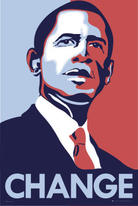 I think this has to start with an apology. I’m sorry. In my eagerness to get Singular out and published, I skipped editing steps and that was really not excusable. As a result I put out a book that I’m calling “the riddled with errors edition” (TRWEE). I’ve spent the last several weeks putting these right – this is why there haven’t been any new posts on the blog. If you buy the book now, from any retailer (US or UK), then it is the much-improved and slightly shorter second edition you’re buying. The joy of print-on-demand is that there’s no redundant stock lying around. If you previously bought the Kindle edition, my understanding is that you should be able to delete your current book and download the new one – but I’ve just made the changes to Kindle so I’d give it a few days before you do. Now, if you’ve bought TRWEE let me say several things. Thank you for your support. The first readers of any book are so important and my gratitude is genuine and gushing. I don’t want any of you to feel you’ve got a bum deal out of this so I’ll give you a choice. Option 1) You can hold onto TRWEE. You paid for it after all. It’s the first edition and might be worth something one day. TRWEE also includes a stanza from Wilfred Owen’s poem Insensibility (about half way down p164). Owen died in 1918 and his work would normally be out of copyright, but this poem was published posthumously and so a different law applies. It’s a fair cop (though a fairly stupid law) and for this reason it doesn’t appear in the second edition. It's the only change I made that lessons the impact of the book. Option 2) You can exchange your TRWEE for a second edition. Use the make contact form on this website and I’ll give you an address where you can post it. Once I have your TRWEE I will send you two – yes two – copies of the second edition. One copy I will sign for you and the other you can give to a friend. Unless you don’t like the book, in which case you can give it to an enemy. (Any copies of TRWEE returned to me will be destroyed and replacement copies will be the Lulu / UK version). I’m about to start mailing copies to reviewers, so for the next couple of months I will have a supply. But as I have no idea how popular this will be I can’t make any promises on timescales.  Technically I’m preparing for my first book event. I mean... Wait, let’s start with the details. On Sunday, 7pm UK time, I’ll be going on the Industry 101 Show at TMOA to talk about Singular. I used to do a news break for the show, which I stopped doing in 2009 to devote more time to my writing. I haven’t been on the show since, but I’m sure they often talk about me. “I wish Porteous was here”, “This show was so much better when David was on”, “Wasn’t it good, wasn’t he fine, isn’t it madness he can’t be mine” – stuff like that. I expect I’ll talk about the book and about self-publishing. Someone will confess they don’t know how to read (possibly me), we’ll be joined by a surprise caller whom DNA tests have confirmed to be my hitherto unknown son. And the hosts will swear at each other. It’s that kind of a show. If you’re free on Sunday, listen in. If any man was ever more excited about a brown paper package delivered by Royal Mail, it would only be because he planned to have sex with the contents.
I arrived home late last night, after a great “Monday Club” dinner at McKirdy’s Steakhouse with some old friends, to find a slim 9” by 6” parcel waiting for me. Like all such parcels it had been wrapped to ensure it would stay in pristine condition for the archaeologists of future generations to open using their advanced technology. One minute and some damage to my dental work later I had the joy of holding the first ever paper copy of my first ever novel in my hands. Only those of you who are parents of especially beautiful children will know what this feels like. So the news is this: print copies of Singular are now on Amazon.com (and all good retailers everywhere). This means you can get free delivery on the book if you buy another $15 of stuff – for example, another two copies. (I’m just saying you could). I’m working on broader UK distribution channels, but until that’s set up the book will still be available from Lulu. Follow me (@dfpiii) on twitter to be kept up to date. 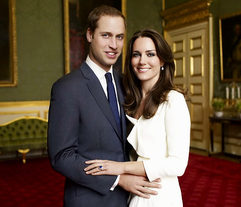 “What you should do is get a picture of a celebrity reading a book and photoshop the cover of your book onto it,” says M. “Then sell it to Heat or Hello”. “Most of your ideas seem to involve lying,” I observe. “And being sued,” adds L, whose voice is on the far, dark side of sultry. She has already confessed her concern that this sore throat may prove fatal. We have gone to lunch like a rudderless ship leaves port. Instead of our original destination we’ve been blown into the Scottish Storytelling Centre Cafe, on Edinburgh’s Royal Mile. The girls were enthusiastic. I’ve never been before. It’s nice. There’s a lot of stylishly misshaped wooden furniture and it feels like an affluent community centre rather than a tourist spot. (Though this is March; in July it’s probably different). I’m having one of the specials; salmon fishcakes. I enjoy them because they’re delicious and have been served with a simple but perfectly judged salad. I do not know what future me knows; that they, like all salmon-based foods before them, will repeat on me well into the evening. “What about libraries?” “You can actually go into a library right now and order my book,” I say. And I’m pretty sure that’s true – though I haven’t tried. “Do that then,” M says. “Go into every library and request a copy of your book”. “That doesn’t seem like a scalable strategy,” I say, increasingly worried that the launch of my book is turning into a caper or an Ealing comedy. To be fair to M, it’s not that her suggestions are crazy; it’s that they are shameless and I am not. My comfort zone quivers and shrinks just thinking about them. We’ve gathered to talk through different approaches to the marketing and communications strategy for my novel, Singular. Released only the day before in print and a few days before that in Kindle, so far the Times has not asked me for an interview: I have not been booked to appear on the morning shows: the Booker Prize people have left that path to my door entirely unbeaten. “Do you know how many people there are trying to do the same thing?” asks L, clearing some phlegm. She means trying to successfully self-publish a first novel. I don’t believe anyone knows exactly what that figure is. But for every book that gets published there must be a hundred manuscripts chasing a deal. “Loads,” I say. And, with the in-person charm that is so difficult to capture in writing, I add, “There must be thousands of crazies pushing their stuff”. Even I have to remind myself that this is actually part of a long term plan and that self-publishing is not a form of delusion. Singular was knocked back by one agent – it was an experience I found so distasteful that I vowed not to fall into the leg-hold trap of posting my manuscript out, waiting hopefully for two months and then being rejected. Once was enough. Repeating the process seems like something that could be categorised as “cruel and unusual”. Publishing has always seemed to me, as an outsider, like Guantanamo Bay with reading glasses: a gritty prison drama where the writer is the guy with delicate features who you know faces brutal sexual assault sooner rather than later. (I wish I could tell you that Stephen King fought the good fight...) Instead, I decided that I would put the book out there myself – with a little help from the self-publishing arm of Amazon. I get people to read the book, I get feedback, I get to pick up women by telling them I’m a writer. (By the way, that doesn’t work any better than the line “I’m a stand-up comic” – but at least nobody challenges you to write them some prose on the spot or make them think about the human condition in a new way). A year down the road – and this is where it all becomes a bit dream-like and hazy – I walk into the offices of Hodder and Stoughton and reluctantly agree to accept a generous three book deal. There is champagne and confetti. Someone asks me to sign their baby. Peace is declared across Europe. And so on. The thing is; I genuinely believe this is a good idea. Ten years from now a writer’s first work being self-published will be the norm. In fact as big companies continue to push holiday reading and books about topless boys who are also vampires, and self-publishing channels become more accepted, it’s likely that most literary and genre fiction will never be published in the traditional sense. And all this will probably happen in ways nobody expects – the same way everything else did. “I don’t really like science fiction,” says L, one of my trusted readers of an early draft. “Like, at all”. “It’s not really science fiction,” I say. “I mean there aren’t any spaceships in it”. “But the things in it could never happen”. (Only the day before she’d told me she believes in ghosts). “Well-” I say, and put my ducks in a row for a lengthy explanation of why it jolly well could. “It’s not news,” M says, voicing her own thoughts and elucidating the problem of why the local paper, the Edinburgh Evening News, wouldn’t be much help. “Did you hear about that girl who made the royal wedding sick bags? She got a load of publicity. It was interesting, it was cheeky. It’s the kind of thing you’d get shot for in another country”. I had already begun to suspect my choice of a front cover depicting the isolated nature of self and the unknowable consequences of all decisions was a mistake. What I should have gone for was Prince William and Kate Middleton superimposed on the union flag. Commemorative editions: manufactured nostalgia: kitsch; that’s where the Daily Mail reading British public are at. She wasn't wrong. “I wish someone would just send me a message,” L says, perfectly summing-up the conversation. “Okay,” says M. “One last idea...” |

